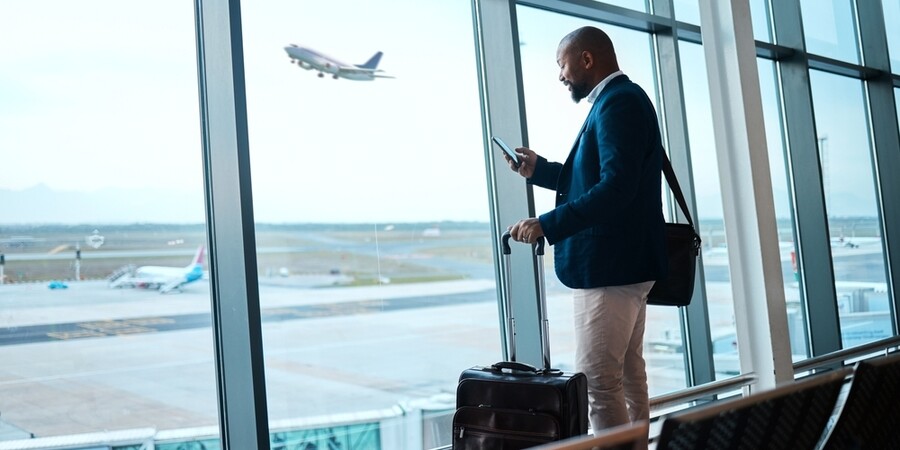Successful corporate ventures involve careful planning and execution in all aspects. And business travel is no different. Though it may sound easy, understanding the intricate details of how to plan a successful business trip is a bit difficult. There are numerous variables involved while planning a corporate trip such as dynamic flight fares, flight cancelation, employee unwillingness, emergencies, and many more. Hence, to ensure smooth business travel, let us discuss the basics on how to plan successful business trips.
How to plan successful business trips
We can divide the planning of a business trip into three sections: Pre-trip planning, during-the-trip plan, and post-trip planning. Let us explore these avenues differently.
I. Pre-trip planning

1. Determine objectives
Every endeavor should have a clear purpose or aim. Corporate can define the outcome of a trip for the employees and brief them about it. It can be meeting new prospects, delivering customer support service, participating in an event, etc. A set guideline will help in evaluating the degree of success or failure of the trip.
2. Establish a budget
As corporate travel makes up the second largest expense of corporate after salaries, budgeting becomes a crucial step of planning. Travel managers should coordinate with partnered TMCs to find the best flights, connections, and accommodations. Further, They should allocate a budget for transportation, meals, and other expenditures.
3. Research destination and make an itinerary
While planning a trip to a foreign land, travel managers and traveling employees need to know about the destination. They should be aware of the local geography, local customs, and business etiquette. Additionally, they should understand the local laws and special considerations of the location. Another important aspect of a business trip is defining a clear itinerary. Travel managers should maintain departure dates, business meetings and events schedules, and other such details and share them with the employee and TMCs.
4. Transportation
Choosing a suitable transport can help travel managers save highly on trips. They should also ensure a good travel experience and minimize connecting flights. Moreover, if trains are possible and the schedule allows for it, travel managers can also use railways, which will cost much lesser than flights.
5. Accommodation
Booking hotels can be a tough job for travel managers. The travel admins should consider budget, location, and amenities while selecting accommodations for their employees. They should make reservations for securing top discounts and ensuring the room’s ready availability.
6. Travel documents
Admins can provide brief guidance about the travel documents required to travel to a particular country. Employees should produce all the necessary documents such as passports, visas, or other documents beforehand. The validity of these documents should be ensured before travel and any discrepancy should be filed for correction if needed.
7. Travel insurance
Travel insurance is essential to protect employees against unforeseen or unfortunate circumstances. Moreover, corporates should ensure that TMCs provide support and look after the travel insurance of the employee. Travel managers should read the terms and conditions of the insurance policy to avoid future hassles and disputes.
8. Contact and schedule meetings
All the involved parties should have each other’s contact information to establish better communication. Sometimes it may be possible that meeting schedules can change on the go; hence, stakeholders should remain in mutual agreement for fulfilling the purpose of travel.
9. Prepare meeting materials
Gathering and providing the right presentations, documents, or contracts to the employee is essential. Employees should remain prepared for the meeting and organize their relevant material to avoid any miscommunication or delay. These documents should provide prompt solutions to any problems raised during or after the meeting.
10. Create a packing checklist
Travel managers should prepare a comprehensive list of essential items to pack. This can include business attire, electronics, adapters, business cards, and any specific materials required for the trip. They can also create and share the packing list as per the location, weather, and culture.
II. During the trip

12. Time management
Employees should understand the importance of the schedule and should strictly adhere to it. They should arrive at the meeting venue earlier than the set time. Maintaining a personally enforced schedule for exercise, lunch, dinner, outings, etc. will help in enhancing the overall experience of the trip.
13. Networking opportunities
On the trip, employees become the ambassadors of the company. Therefore, it is crucial to train the employees with the soft skills required to aptly represent the business. They can build a network of potential clients and contributors while carrying out simple meetings or participating in corporate events.
14. Expense tracking
Employees should record all of the expenses made during the corporate travel and keep the receipts handy with them. Doing this will help them get reimbursements for any out-of-pocket expenses that were necessary during the trip.
III. Post-trip follow-up
15. Recap and evaluation
A business trip report should be shared with the higher management to analyze and evolve with the prior trips. The feedback loop creates the opportunity to know about the personal experiences of the employees and build on a constructive path.
Corporate trips are essential to expand the reach and potential growth of businesses. Therefore, knowing the details about how to plan a successful trip is highly important for ensuring adequate ROI, both tangible and intangible. And planning for the trip and ensuring that the following through of the plan is of optimal importance to ensure the least amount of creases in a Business’s growth trajectory.
How To Plan Successful Business Trips FAQs
What constitutes business travel planning?
Business travel planning constitutes pre-trip planning, during the trip planning and adjustments accordingly to pre-trip plans and creation of a post-trip plan of recapping and objective evaluation.
What is pre-trip planning?
Pre-trip planning involves determining key objectives, budget allocation and itinerary creation. These are to be done well in advance of the trip if timings and internal tasks allow for it and little if not none of the planning must happen last-minute.
What is during the trip planning with respect to business travel?
Not all circumstances are foreseeable and plans rarely go pitch-perfect. Therefore assessment of the current scenario and planning as required during the trip and making necessary adjustments to the plan or adopting contingencies is necessary in most cases.
What constitutes post-trip evaluation in business travel planning?
After the completion of a business trip, the entire picture can finally be seen and studied. All considerations and plans made before and during the trip can be reflected upon, recorded and improvements that are possible should be considered. These constitute post-trip evaluation and it is very integral to do these evaluations whether a corporate is outsourcing its travel management or whether it is dealt with internally. Because efficient expenditure and smooth execution of plans is of extreme importance to running a business.



